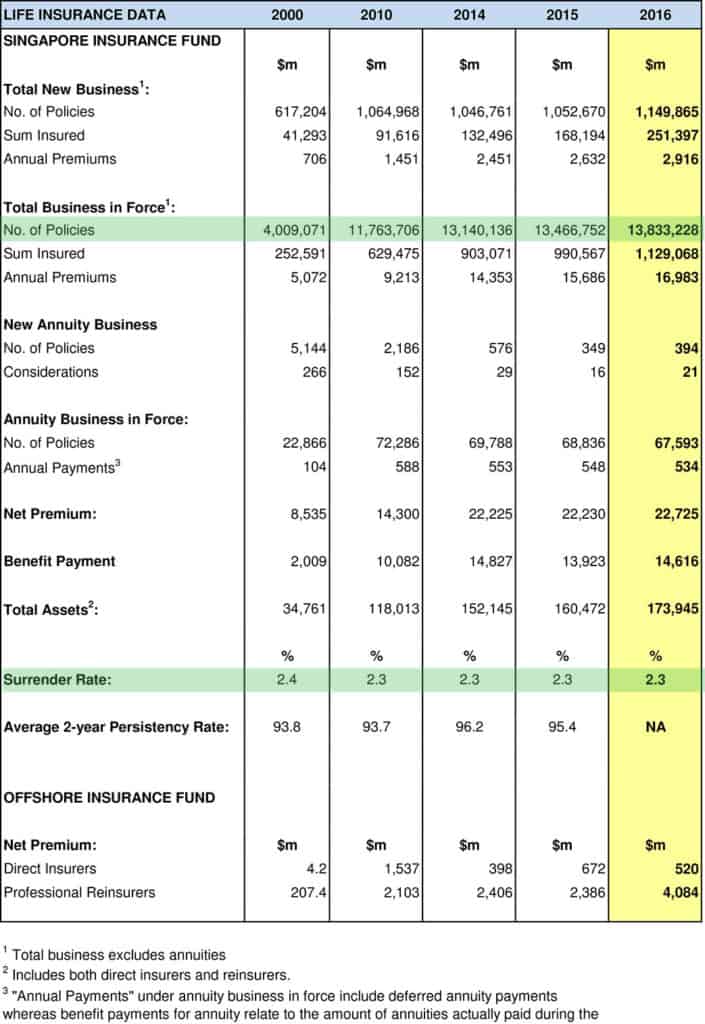Discontinue your Insurance Policies
Knowing the Options

Generally, 8 out of 10 people in Singapore own an insurance policy. But not everyone is fully aware of the viable options when the need arises for them to cash out their policies effectively.
According to the Monetary Authority of Singapore, the total number of life insurance policies in force as of 2016 is 13,833,228. And the surrender rate is 2.3% consistently from 2010 to 2016. The common reasons for discontinued plans are generally due to financial stress and portfolio restructuring.
Below are the possible options available that can be performed on your life insurance policies so that informed decisions can be made when there is a need to free up cash flow.
Figure 1: Key Financial Indicators: Life Insurance Data (Monetary Authority of Singapore)
Surrender the Policy
Surrendering / Terminating the policy is one of the most common ways that come into most peoples’ minds first. This is completed by filling up the respective insurance companies’ surrender form which is to be submitted back to the insurance company. The process can be done over the counters at the respective insurance companies’ customer service centers, through your own Insurance Agents/Bankers/Financial Representative, or by mailing in the form by yourself.
How much money you would be getting back from your policy would be based on the surrender value that the insurance companies determine. Usually, for endowments policies that are being surrendered/terminated early before their maturity date, the amount you receive will generally be lesser than your total premiums paid.
Furthermore, for a policy that is within the 1st three years from the policy issuance date, there is a likelihood that the surrender value will be zero. In this case, you can simply stop paying the premiums and let the policy lapse.
Stop paying your premiums
Due to hectic work schedules, some of us may be too busy with daily tasks and decide to stop the payment for our insurance premiums first. This may be because they do not want the policy anymore. Hence, they stop the premium payment with the intention to deal with the policy when they have time on a later date.
However, if premiums are not paid within the grace period (usually 30 days after the premium due date), the insurance company will automatically pay an overdue premium by taking a loan against the cash value of your policy. Do take note that interest (usually 5.5%-6.75% p.a.) will be charged for the policy loan.
In a situation where the cash value is insufficient or is zero, an automatic premium loan will be unable to be activated. As a result, the policy would lapse, and all benefits of the policy cease once terminated. However, lapsed policies can be reinstated (usually within two years), and a reinstatement fee will have to be paid, subject to the insurer’s approval.
Taking Policy Loan
Taking a policy loan is like having your overdue premium automatically paid through a loan. However, by initiating the request for a loan from the policy, you will be able to loan a greater amount (usually up to 90% of the policy cash value).
This will be a viable option if you can pay back the policy loan within a short time. Otherwise, the interest of the policy loan will gradually consume your policy cash value if prolong for an extended time.
Convert to a paid-up policy
If your policy has built up sufficient cash value, it may be converted to a paid-up policy. In this case, you can stop paying premiums and your policy will stay in force for a reduced sum assured for the rest of the policy term.
This will be a good option if there is no need to cash out the lump sum cash value of the policy. The paid-up policy will also provide you with continued coverage. However, do consider the time value of money, as the surrender value from surrendering the plan may provide much better returns if invested elsewhere.

Sell to a third-party company
If you have already decided that you want to give up the policy, it would be advisable to consult a third-party company like REPs Holdings to check if your policy could be sold to them instead. By doing so, you can get back more than the surrender value from your insurance company.
It is also possible for them to takeover policies that have lapsed or with loans.
Conclusion
To sum things up, there isn’t one best method to give up your insurance plan. As everyone has different needs and situations, it is best to consider which solution can fit your circumstances better. However, if have already decided to surrender your policy, it will be better to sell it to a third-party company like Reps Holdings to get a higher value instead.










